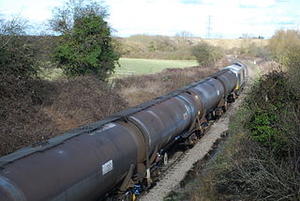HazmatWest Virginia mulls releasing crude oil shipment information to the public
In May 2014, the U.S. Department of Transportation(DOT) ordered railroads operating trains carrying more than one million gallons of Bakken crude oil to notify state emergency officials in states through which oil-carrying trains travel of the expected movement of such trains. The order came to allow first responders to be better prepared should an accident occur. CSX Corporation agreed to share shipping information with West Virginia officials, but refused to release the information to the public citing concerns about terrorism. DOT made it clear that citing terrorism concerns does not exempt crude oil shipment information from being released to the public.

The wisdom of disclosure of oil shipments continues under debate // Source: commons.wikimedia.org
In May 2014, the U.S. Department of Transportation (DOT) ordered railroads operating trains carrying more than one million gallons of Bakken crude oil to notify state emergency officials “regarding the expected movement of such trains through the counties” in each state. The emergency order, which includes notification of estimated volumes of Bakken crude, shipment schedules, and routes, was a result of several accidents tied to shipments of crude oil from the Bakken region of North Dakota. In April, a CSX train carrying three million gallons of crude oil derailed in Lynchburg, Virginia, causing fire and spilling oil into the James River.
Today, states which have received crude oil shipment information from railroads are deciding whether to make such information available to the public, or limit it to state emergency management officials who use the information to prepare for disaster should an oil train derail or explode. The Charleston Gazette reports that West Virginia emergency response officials are reviewing the legality of publicly disclosing rail shipment information provided by CSX Corporation. In June and July, the state Division of Homeland Security and Emergency Management (DHSEM) refused a public-records request from McClatchy Newspapers and the Gazette-Mail for information regarding CSX’s rail shipments. DHSEM spokesman T. D. Lively reports that CSX had marked the pages containing requested routes and schedule information as “confidential security information”— for anti-terrorism reasons and “proprietary business information.”
In response, DOT’s Federal Railroad Administration made it clear that citing terrorism concerns does not exempt crude oil shipment information from being released to the public. Shortly afterwards, West Virginia’s Homeland Security director Jimmy Gianato announced that CSX’s claim of shipment information as “proprietary” could restrict it from being publicly disclosed, according to West Virginia’s public records law which includes an exemption for certain “trade secret” information.
Today, the state is re-examining that determination. “We are reviewing the records to determine whether this information is actually a protected trade secret and exempt from FOIA disclosure or is public information,” Lively said. “As you know, some states have released the information, some have denied release, and others have yet to make a decision. We are reviewing the document and applicable laws to sufficiently respond to the FOIA request.”
CSX communications director Carla Groleau insists that the railroad “is committed to sharing what it hauls, and where it goes, with first responders,” but certain customer shipment information is “sensitive and proprietary.” She notes that CSX has provided emergency officials in nineteen states a special technology called “SecureNow” which allows them to track “in virtually real time” the location of CSX trains and their contents.
